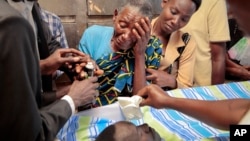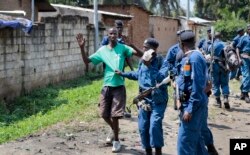Burundi is delaying its presidential elections following protests against the president’s bid for a third term in office. The move comes as regional bodies urge continued dialogue with the opposition to resolve the political crisis in the country.
Burundi’s President Pierre Nkurunziza issued a decree late Tuesday postponing the presidential vote to July 15, about two weeks later than initially planned.
Parliamentary elections have also been pushed back about a month and are now scheduled to be held June 29.
Presidential Spokesman Gervais Abayeho told VOA the new timetable is designed to give the opposition time to organize for the vote.
“Those opposition parties that were complaining they didn’t have enough time to campaign given the situation that was prevailing here, so that they can be given ample time to do so, that is the motivation behind that,” he said.
Opposition parties and civil society activists have led weeks of street protests against President Nkurunziza’s plans to run for a third term in office, which opponents say would be against the law.
Some opposition leaders rejected the new timetable for elections when it was first proposed by the country’s electoral commission.
A spokesman for an opposition coalition told VOA Daybreak Africa Tuesday the commission did not have the legal mandate to change the dates.
The election delay is in line with recommendations put forward last month by East African heads of state.
Hope for further national dialogue
Meantime, the International Conference of the Great Lakes Region has urged the government to continue a national dialogue with members of the opposition and civil society to find a way out of the current crisis.
Ambeyi Ligabo, the Director of the ICGLR Governance and Democracy program, says: “We are optimistic that both parties can see sense in the need to have dialogue to avoid any violence and also disruptions of economic and trade activities among member states of ICGLR.”
The United Nations has raised concerns about an escalation in political violence around the polls.
On Tuesday, the High Commissioner for Human Rights, Zeid Ra’ad Al Hussein, said the United Nations has been receiving “deeply worrying accounts” of executions, abductions and other violent acts attributed to pro-government militia.





